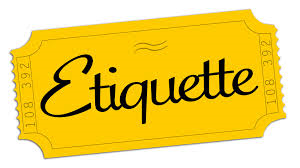
Whether you are an undergraduate in the first semester of your first year, a PhD candidate preparing for a dissertation oral defense, or a seasoned professional ten years into your career, the way you present yourself matters. By following current trends in etiquette, you can stand out from your peers to gain an edge in your field.
Etiquette, or acceptable social behavior also known as “good manners”, has evolved from a strict set of rules and advice on everything from good breeding and hygiene into what some might say are a “relaxed” set of norms. And, with the advent of social media, these norms have stretched good manners in many cases to their breaking point. UConn’s Center for Career Development will strive to provide you with tips, trends and guidelines for etiquette today.
Making and Keeping Appointments
It can never be stressed enough that if you make an appointment or confirm your attendance to an upcoming event, you should show up to that appointment or event on time and prepared. Have you ever scheduled a doctor’s appointment, but did not show up? Often, a doctor’s office will charge you a hefty “no-show” fee for these missed appointments. While aggravating and financially inconvenient to the patient, consider the impact to the doctor, their staff and other patients of that office which includes lost revenue and staff time and labor, not to mention the inconvenience to other patients who could have taken that appointment.
In the same way, when someone confirms their attendance at an event, not showing up has negative consequences to the host of the event which can include time and labor, financial costs such as food, room reservations, and speaker fees, and can even cause social embarrassment to the host or speaker by having a less than expected attendance.
The following steps can be followed to assure you display “good manners” when you receive and reply to an invitation:
- Review the details of the event and determine if you plan to attend.
- Check your calendar and review your availability before confirming your attendance.
- Confirm your attendance by following the invitation instructions. Often, you will see the acronym “RSVP” on an invitation which, when translated from French into English, literally means “Reply if it pleases you”. An invited guest would only then reply if they expected to attend. However, today many people translate “RSVP” as “Please Respond” so you may follow these guidelines in your “RSVP”:
- When an invitation states “Regrets Only” – reply only if you DO NOT plan on attending (otherwise the host expects to see you at the event).
- When an invitation states “RSVP” and indicates a phone number, email address, or hyperlink (often used in online or emailed invitations) – contact the host only if you plan on attending. This is especially true when you do not personally know the host and it is a large event.
- When in doubt, or if you personally know the host, you may RSVP either your attendance or politely decline your attendance.
- It is not required that you provide the host with your reason for declining to attend. If you are asked why you will not be attending, you may indicate that you have another commitment.
- Prepare a reminder for the event – Most people today have some form of a calendar whether it is electronic such as a cell phone app or computer program, or a handwritten calendar book.
- Do not show up at an event you did not RSVP to without the express permission of the host.
- Do not bring additional guests to an event without the express permission of the host.
- At the end of any appointment or event, it is polite to take the time to thank the host for inviting you. If the opportunity to thank the host is not available, you may send them a short note of thanks (handwritten notes are preferred and most appreciated while emails are acceptable in certain circumstances – it depends on the impression you want to give). You want to be invited again!
Remember – You never know who you are going to meet on your path in life. Good manners can make that path easier to follow while, alternatively, bad manners can burn bridges and hinder your success.
Photo: ibm.com
